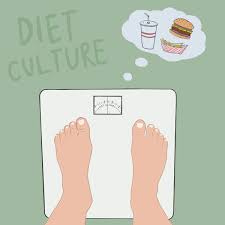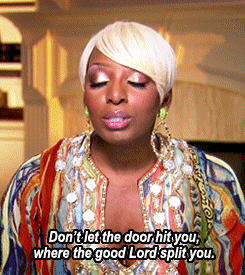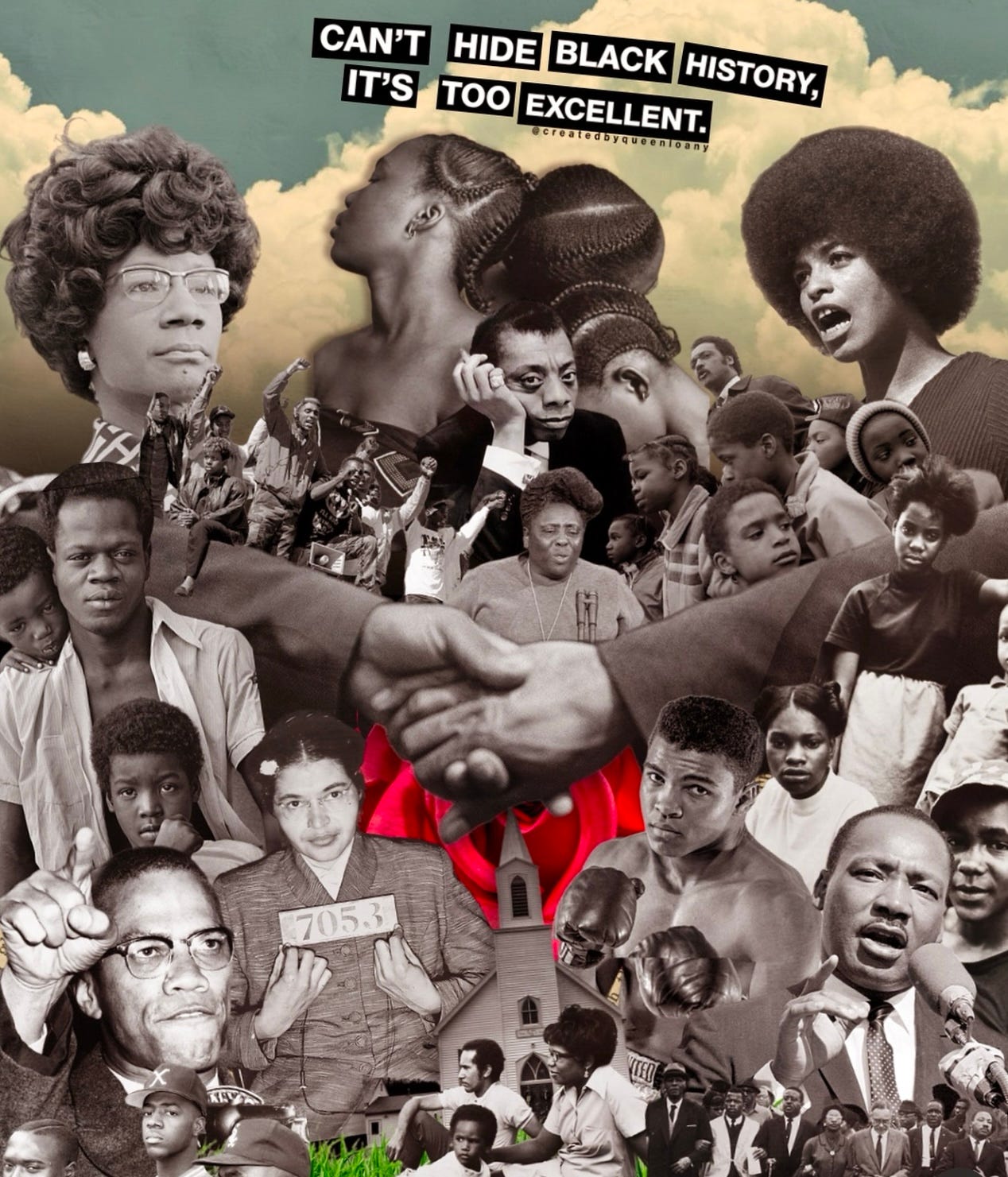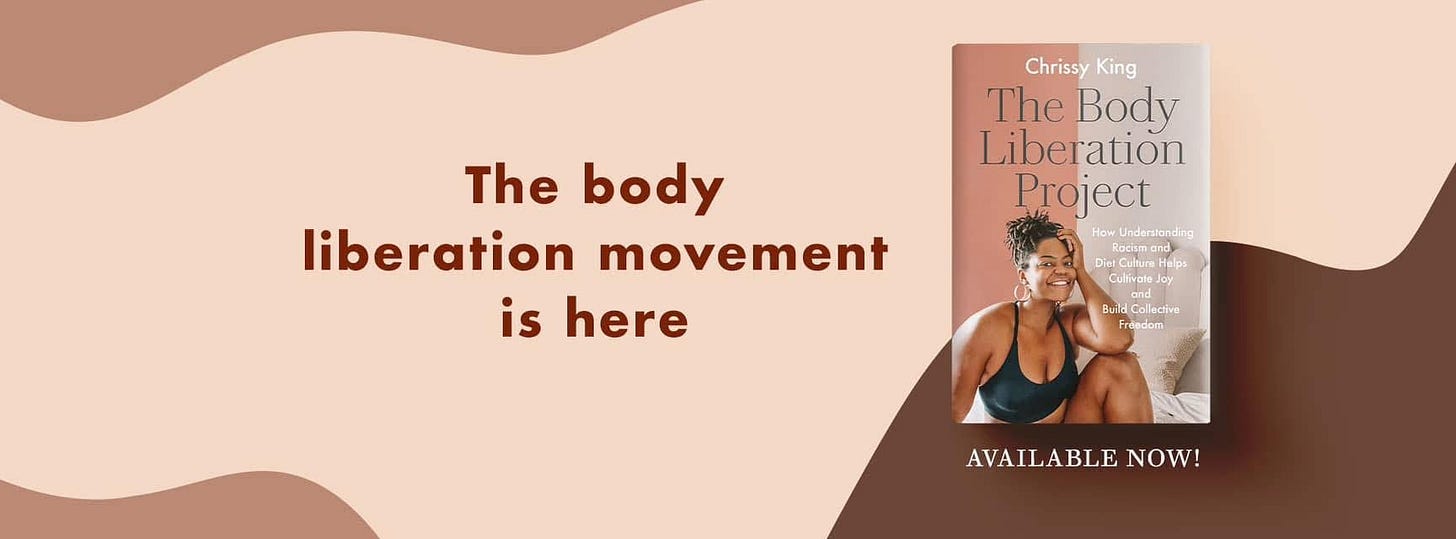The Cultural Obsession with Thinness and the Incessant Desire to Pursue that as the Status Quo is about Obedience.
.....thankfully these Black women are helping us heal our relationships with our bodies.
January was quite literally the longest month in the history of months, and quite frankly, I'm happy it's behind us.
Welcome to February. And regardless of nationwide DEI rollbacks and Don the Con's attempt to abolish Black History Month, Black history and Black people aren't going anyway, and delusional Don is just going to have to deal with it because this country has never been able to keep Black people down, despite its ongoing attempts dating as far back as the Transatlantic slave trade.
photo: @createdbyqueenloany
In the spirit of BHM, I want to use this week’s newsletter as a love letter of sorts to Black women. To all the Black women who are collectively helping people heal their relationships with their bodies.
I can’t be the only one who has noticed that diet culture and 90s fatphobia is back in full force, and it’s unrelenting. Over the years, I have discussed ad nauseam, that if we ever seek to dismantle diet culture we have to acknowledge that it’s rooted in racism and white supremacy.
As Sabrina Strings, Ph.D. discusses in her book Fearing the Black Body: The Racial Origins of Fat Phobia, Black people have historically, and intentionally, been linked with fatness dating as far back as the 19th century. "One of the things that the colonists believed was that Black people were inherently more sensuous, that people love sex and they love food, and so the idea was that Black people had more venereal diseases and that Black people were inherently obese because they lack self-control," writes Strings. "And of course, self-control and rationality, after the Enlightenment, were characteristics that were deemed integral to whiteness."
Over time, this connection between Black people and gluttony has become internalized and upheld, making diet culture's rejection of larger bodies inherently racist.
As I have previously discussed, the intentional return to the focus on thinness is by design.
The return to 90s fatphobia and the obsession with female thinness coalescing with an ever increasing attempt to roll back the rights of women, both reproductive and marital, is deliberate.
They want us distracted. They want us to keep making ourselves as small as possible — literally and figuratively. They want us immobilized. They wanted us sedated. They want us to do anything and everything besides take our power back.
And dieting accomplishes all of that.
The cultural obsession with thinness and the incessant desire to pursue that as the status quo is about obedience. When we’re obsessed with the size of our bodies and using our energy towards the pursuit of thinness, we don’t have the energy to focus on the things that really matter — like our rights.
But luckily for all of us, there are a slew of Black Women writers working to fight against the culture norms and status quo, despite the odds.
As you may or may not know, the publishing industry is overwhelmingly white. Only 6% of published authors are Black -- an abysmally low number. And with the shifting political tides, that number is likely to drop, impacting authors of color even more as the previous commitment to publishing diverse works will likely dwindle.
It's becoming increasingly more important to support the work of Black authors, not just during Black History but year round.
All that said, below are six books to combat the resurgence of diet culture and help heal your relationship with body image and food.
1) The Body Liberation Project: How Understanding Racism and Diet Culture Helps Cultivate Joy and Build Collective Freedom by Chrissy King
Of course I'm starting with my own book. Shameless Plug. For those who haven't read my book yet, The Body Liberation Project is about finding actual freedom in our bodies by discovering strength and aspects of fitness, movement, and eating that work for you. It’s about realizing that the goal is not to look at our bodies and love everything we see; it’s to understand that at our essence we are so much more than our bodies. But it’s also about recognizing the harsh realities that prohibit people in marginalized bodies from being able to do so.
Society constantly bombards those who fall outside Eurocentric standards of beauty (think Black, fat, trans, etc.) with the message that they are less attractive, and part of the journey toward body liberation is examining your own privilege, acknowledging the harm you may be causing others, and mourning your old ideas about what a body “should” look like. Recognizing that none of us are free until all of us are free, I encourage readers to find body liberation and, even more important, to pass it on in pursuit of collective liberation.
2) The Body is Not an Apology by Sonya Renee Taylor
I read this book over a decade ago, and it was pivotal in helping me on my own journey towards body liberation. The Body Is Not an Apology offers radical self-love as the balm to heal the wounds inflicted by the violent systems of diet culture. In this book, Sonya Renee Taylor invites us to reconnect with the radical origins of our minds and bodies and celebrate our collective, enduring strength. As we awaken to our own indoctrinated body shame, we feel inspired to awaken others and to interrupt the systems that perpetuate body shame and oppression against all bodies and embrace radical self-love.
3) It's Always Been Ours: Rewriting the Story of Black Women’s Bodies by Jessica Wilson
In It’s Always Been Ours, eating disorder specialist and storyteller Jessica Wilson challenges us to rethink what having a "good" body means in contemporary society. By centering the bodies of Black women in her cultural discussions of body image, food, health, and wellness, Wilson argues that we can interrogate white supremacy’s hold on us and reimagine the ways we think about, discuss, and tend to our bodies.
She blends historical documents, contemporary writing, and narratives of clients, friends, and celebrities that examines the politics of body liberation. Wilson argues that our culture’s fixation on thin, white women reinscribes racist ideas about Black women's bodies and ways of being in the world as "too much."
4) Live Nourished: Make Peace with Food, Banish Body Shame, and Reclaim Joy by Shana Minei Spence
In Live Nourished, Shana Spence starts by exposing diet culture for what it is: a patriarchal, capitalist mindset that is engrained in countless aspects of our society, and that keeps us from living healthily and joyfully. It’s a systemic belief that equates fitness, health, and thinness with worth and assigns food a moral value. And it’s a belief that pervades our society. Through a takedown of diet culture in all its forms, Spence explains why diets don’t work, and provides you with the courage and the knowledge needed to prioritize nourishing the body and soul.
5) Reclaiming the Black Body: Nourishing The Home Within by Alicia McCullough
In this book, McCollough validates the lived experiences and generational traumas of BIPOC communities. As part of a steadily growing movement among clinicians to “decolonize therapy,” her deeply affirming approach seeks to understand disordered eating patterns by examining the psychological wounds left by centuries of racism.
Weaving together crucial history, compelling client stories, guided meditation, journal prompts, and McCullough’s own journey with disordered eating behaviors, Reclaiming the Black Body offers readers a safe space to feel seen and illuminates the way home, back to the safety and comfort found within our bodies.
6) Movement for Every Body: An Inclusive Fitness Guide for Better Movement by Marcia Dernie
This book is an inclusive, full-color guide to improving mobility, building strength, and increasing flexibility for every body and any size, shape, and ability and focuses on the concept that exercise should be enjoyable—not punishing, elitist, or overly competitive. Part exercise manual and part workbook, Movement for Every Body celebrates this approach and champions an inclusive movement practice for anyone who doesn’t fit the "typical" fitness mold and doesn’t wish to.
And finally, here are some simple ways to support Black authors this month (and every month):
1) Buy these books.
2) Share these recommendations with a friend.
3) Leave a positive review on Goodreads or Amazon (totally free and incredibly helpful).
4) Follow them on social media and share their work.
5) Subscribe to their paid newsletters to support their ability to continue writing and publishing.
6) Ask your local library to stock these books.
Support Black Women Writers.
Your support as a paid subscriber on my Substack is essential to sustaining the work I do. I’m committed to keeping my writing accessible to everyone, but to maintain this structure, I need your help. By subscribing, you’re not just supporting me, a Black woman writer, you’re investing in a platform that’s committed to sharing meaningful and thoughtful content.
Please consider joining as a paid subscriber today to support my work.








Thank you for this insightful piece, which reminds us that our culture's obsession with thinness is PROPAGANDA, designed to oppress and disempower us.
May I also recommend my book, "Size Matters: The Large Woman's Comprehensive Guide to Living Well" as a resource for large-bodied women to reclaim their right to live full and satisfying lives, even as we are led to believe that we need to change our bodies to deserve goodness? It is available on Amazon and at other book retailers. My Instagram is @booksizematters.